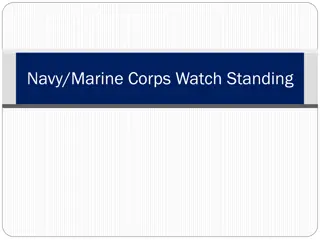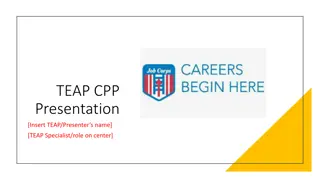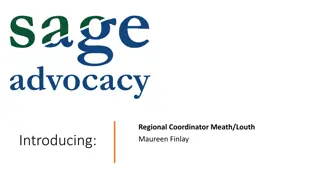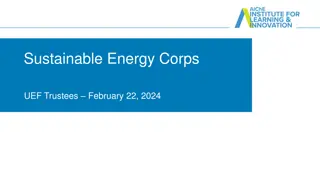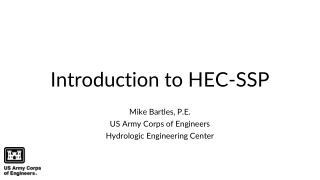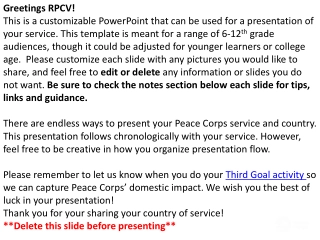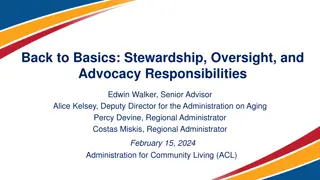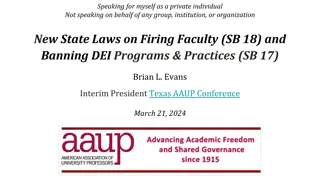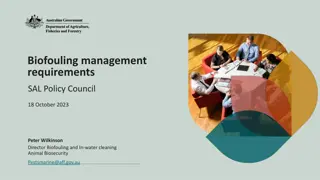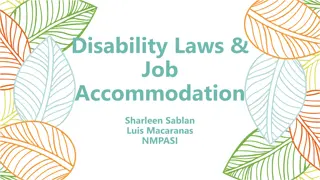Opportunities in Marine Corps Judge Advocacy
Marine Corps Judge Advocates play crucial roles in criminal litigation, operational and international law, and civil law. They undergo specialized training and serve as leaders, professionals, and dedicated advocates. Through practical experience and continuous education, they excel in representing clients within the military legal system.
Download Presentation
Please find below an Image/Link to download the presentation.
The content on the website is provided AS IS for your information and personal use only. It may not be sold, licensed, or shared on other websites without obtaining consent from the author. Download presentation by click this link. If you encounter any issues during the download, it is possible that the publisher has removed the file from their server.
Presentation Transcript
U Un ni it te ed d S St ta at te e M J Ju ud dg ge e A Ad dv vocate Ma ar rine ocate ine Cor Corps ps
US Marines Commercial Fighting Spirit https://www.youtube.com/watch?v=yotXRoLxFdY
U Un ni ited ted S St ta at te e M Jud Judg ge e Ad Ma ar rine Adv voca ocat te e ine Co Cor rps ps As a Marine Officer and a Judge Advocate you will embody: Leadership Professionalism Service
I In nt troduction roduction Common Areas of Practice for Marine Corps Judge Advocates Criminal Litigation. Operational and International Law. Civil Law. Marine Corps Officer Training Leading Marines: Officer First, Judge Advocate Second. Officer Candidate School (OCS). The Basic School (TBS). Naval Justice School (NJS). Timeline. Incentives to Become a Judge Advocate Continuing Education. Loan Repayment and Other Benefits. Professional Success After the Marines. Summary and Questions
P Pr ra ac ct ti ice ce a as s a a Jud C Cri rim minal inal L Li it ti igat Judge ge Ad gati ion Adv voca on ocat te e Criminal practice in the military involves far more than simply filing charges in a case and then prosecuting or defending the case in court. Commanders, by virtue of their position, are uniquely involved in the legal process. Commanders have a wide range of administrative and disciplinary measures at their disposal, and they depend on their Judge Advocates to advise them on the most appropriate course of action. For that reason, there are many opportunities for a prosecutor or defense counsel to be an advocate in and out of the courtroom.
ce a as s a a Jud C Cri rim minal inal L Li it ti igat Most Judge Advocates will have the opportunity to litigate criminal cases as prosecutors or defense counsel in courts-martial. Cases tried by Judge Advocates range from misdemeanors, such as petty larceny, to felonies, such as rape and murder. Judge Advocates manage their own cases immediately. They quickly acquire the ability to bring a commander s or client s litigation to completion. After serving as a trial counsel or defense counsel, Judge Advocates may serve as Senior Trial or Defense Counsel, managing a team of Judge Advocates while also handling a case load. P Pr ra ac ct ti ice Judge ge Ad gati ion Adv voca on ocat te e
P Pr ra ac ct ti ice Op Ope er rational ational & & I Int ce as as a a J Ju udge nternatio ernation nal Operational Law encompasses the full range of legal services required for commanders to execute their missions. This includes educating Marines and Sailors on the international treaties and agreements that comprise the law of armed conflict, including the Geneva Conventions of 1949 and the Hague Conventions of 1907. In this capacity Judge Advocates provide training to Marines and Sailors on the status of noncombatants, the sick and wounded, and prisoners of war. Judge advocates also facilitate the resolution of legal disputes with other nations and the interpretation of Status of Forces Agreements. dge A Ad dv vocate ocate al L La aw w
P Pr ra ac ct ti ice Op Ope er rational ational & & I Int ce as as a a J Ju udge nternatio ernation nal dge A Ad dv vocate ocate al L La aw w In time of war or armed conflict, Judge Advocates deploy with operational units and provide essential legal services to commanders, deployed Marines, and other service members. Judge Advocates advise commanders on matters such as the rules of engagement, laws of war, and detention operations. Deployed Judge Advocates also handle issues such as investigations, fiscal law, claims, military justice, and other legal issues that arise in a deployed environment. This includes providing legal assistance to deployed Marines.
P Pr ra ac ct ti ice O Op pe er rational ational L La aw ce a as s a a Jud Judge ge Ad w In In A Ac ct tion Adv voca ocat te e ion Capt Justin Martell (front, left), the battalion Judge Advocate for 2nd Battalion, 25thMarine Regiment. Capt Liu (right), meets with a local Iraqi leader in Al Anbar Province
P Pr ra ac ct ti ice ce as a as a J Ju ud dg ge e A Ad dv voca C Civ ivi il l L La aw ocat te e w While the primary practice of Judge Advocates revolves around criminal litigation and operational law, Judge Advocates practice in all areas of law, as needed by the Marine Corps. Common areas of practice include the following:
P Pr ra ac ct ti ice ce as a as a J Ju ud dg ge e A Ad dv voca C Civ ivi il l L La aw ocat te e w Legal Assistance Judge Advocates assist Marines with legal matters such as estate planning, immigration and naturalization law, family law, landlord- tenant law, state and federal tax matters, and consumer protection. Tort Claims Judge Advocates represent the interests of the United States in a broad range of tort issues, ranging from the Federal Tort Claims Act to the Military Claims Act. Labor Law Judge Advocates provide representation in such diverse proceedings as arbitration hearings, grievance hearings, and equal employment opportunity administrative hearings. Contract Law Judge Advocates deal with the Marine Corps multi-billion dollar procurement of technologies and supplies. They review contracts for supplies, services, construction, and research and development and may litigate the Marine Corps contractual claims.
P Pr ra ac ct ti ice ce as Ad Adv van as a anc ced a J Jud ed B Bill udg ge e A Ad dv vocate ille et ts s ocate In addition, Judge Advocates hold a wide variety of advanced positions during their career: Staff Judge Advocate (SJA) SJAs perform duties as a special assistant and legal advisor to Marine Commanders. Officer in Charge of a Legal Support Service Section Judge Advocates may command legal assistance offices, managing other judge advocates who are providing legal assistance and providing their own legal assistance. Military Judges Judge Advocates may become military judges, serving in courts-martial and courts of inquiry. Appellate Counsel Judge Advocates may become appellate counsel, arguing cases before the Navy-Marine Corps Court of Criminal Appeals or the United States Court of Appeals for the Armed Forces.
C Co ore re A As ssignme signmen nts ts Trial Counsel (Prosecutor) 36 Defense Counsel 40 Staff Judge Advocate/ Deputy SJA 58 Legal Assistance 23 Military Justice Management 29 Civil Law 7
O Ot th her er A Assignments ssignments Joint 10 Counsel's Office 17 Command 4 Deployed / Working Up 40 Military Commissions 12 Core Billets 193 8006 (Legal) 14 8006 (Non-Legal) 33 Judges 16 Review 8 LL.M. Students 14 Students (Other) 4 Total: 390 Navy 25
M Ma ar ri ine ne Co Cor rps ps O Offi ffic ce er r T Tr ra ai ining ning Marine Corps Judge Advocates receive the same training as all Marine Corps Officers. Marine Corps Officer Training gives Judge Advocates the ability to lead in both combat and courtroom environments. Marine Judge Advocates are line officers, commonly serving in billets outside of the Judge Advocate specialty . Marine Corps Judge Advocates are Marine Officers first: they are leaders of Marines.
Mission: Officer Candidates School mentors, motivates, and evaluates the leadership potential of all officer candidates who willingly seek the challenge in their aspirations to become U.S. Marine Corps Officers. Officer Candidates School assesses the moral, intellectual, and physical attributes of all officer candidates through leadership, academic, and physical evaluation; a task that is pivotal to the Marine Corps future success.
Ten weeks, Quantico, VA. Completed before law school or during first or second- year summers. Graduates with bar certification may attend Officers Candidate School at various times throughout the year.
T Th he e Ba Bas sic ic S Sc ch hool ool Mission: Train and educate newly commissioned or appointed officers in the high standards of professional knowledge, esprit- de-corps, and leadership required to prepare them for duty as company grade officers in the operating forces, with particular emphasis on the duties, responsibilities and warfighting skills required of a rifle platoon commander.
T Th he e B Ba as sic ic S Sc ch hool ool Areas of Study Leadership Infantry Tactics Field Engineering Military and International law Logistics Combat Intelligence Helicopter Operations Amphibious Operations Marine Corps History and Traditions Martial Arts
N Na av val al J Ju us stice tice S Sc ch hool ool Mission: Train Marine Judge Advocates to deliver quality legal services, promote justice, and enhance Sea Service fleet readiness. Structure: Following TBS, Judge Advocates spend ten weeks in Newport, RI at the Naval Justice School. At NJS Judge Advocates learn the basic aspects of military law including: The Uniform Code of Military Justice; Criminal Law and Procedure; Operational Law; Trial Advocacy; and, Administrative Law. NJS culminates with a round of moot court where each student handles a court-martial before a jury from start to finish.
F Fi ir rs st t D Du ut ty y S St ta at tion Judge Advocates will be assigned to military law (prosecution or defense), legal assistance, and/or operational law, as dictated by the needs of the Marine Corps. They may be assigned to bases on the East Coast, West Coast, or overseas (Pacific). ion - - Washington, DC Quantico, VA Camp Pendleton, CA Miramar, CA San Diego, CA Camp Lejeune, NC Cherry Pt., NC Beaufort, NC Parris Island, SC 29 Palms, CA Yuma, AZ Albany, GA Kaneohe Bay, Hi Other Bases Iwakuni, Japan Okinawa, Japan
T Ti im me eline line S Su umm mmary, ary, P PL LC C- -Law Law 1. 2. 3. Paid Post-Bar Internship, or Civilian Employment, or One year deferral for LLM or Clerkship (not paid) 1. 2. Officer Candidate School, or Civilian Employment 1. 2. 3. Officer Candidate School, or Paid Summer Internship (if Commissioned), or Civilian Employment Before Law School 2nd Year Law School 2nd Year Summer 3rd Year Law School Bar Exam Awaiting Bar Results The Basic School Naval Justice School First Duty Station 1st Year Law School 1st Year Summer Any state or DC 1. 2. 3. Officer Candidate School, or Paid Summer Internship (if Commissioned), or Civilian Employment
T Ti im me el line ine Su Summ mmary, ary, OC OCC C- -Law Law Law School Bar Exam Officer Candidate School The Basic School Naval Justice School First Duty Station Any state or DC
I In nc ce en ntives tives F Fo or r J Jud udge ge A Ad dv vo ocates cates Judge Advocates, based on their duties and status as officers in the Marine Corps, have a wealth of non-salary benefits.
E Ed du uca cat tion ion as a as a J Ju ud dg ge e A Adv dvo oca cat te e Fully-Funded Education Programs Judge Advocate Officer Graduate Course Masters of Laws Judge Advocate General's School, U. S. Army, Charlottesville, VA Master of Laws LL.M. from any civilian law school Environmental Law, International Law, Labor Law, or Procurement Law. G.I. Bill Pays (up to the maximum in-state undergraduate tuition & fees at a public Institution of higher learning) for an advanced degree. Self-Funded Education Master of Laws from any civilian law school Officers may request to attend a civilian L.L.M. program in the subjects above before commencing The Basic School or after their first tour. State or Federal Clerkships Officers offered a state or federal clerkship may request a deferral before commencing The Basic School.
E Ed du uca D De eb bt t & cat tion & E Ed du uc cat ion as a as a J Ju ud dg ge e A Adv ati ion dvo oca ntive es s cat te e on I In nc ce entiv Tuition Assistance Program Up to $5,200/Year towards tuition and books. College Cost Reduction and Access Act Significantly reduced monthly payments based on base bay. Complete forgiveness of any remaining debt after 10 years of public service. Paid Summer Internships Officers who have gone through Officer Candidates School may apply to work at Marine Corps bases around the country during their law school summers and receive active duty pay. Free Online Coursework (Marinenet) For example, Rosetta Stone (dozens of languages) and web design courses.
L Li if fe e as a Mi Mil li itary as a J Ju ud dg ge e A Ad dv voca tary I In nc ce entives ocat te e ntives Financial Benefits Tax Free Housing and Subsistence Allowance. For Example, a married Marine Captain would receive between $1,298 and $2,742/month, tax-free, depending on his or her duty station. Retirement after 20 Years of Active Service. Thrift Savings Plan (Federal 401K). Tax Free Groceries and Shopping. Eligible for VA Housing Loans Medical Benefits Full Medical Coverage for You and Your Family. Full Dental Coverage and Family Plan. Family and Education Benefits 30 Days Paid Vacation Annually and 10 Paid Federal Holidays. Assistance With Spousal Employment.
ine C Co or rp ps s J Ju ud dg ge e A Advo C Ca ar reer eer I In nc ce en nt tives Whether a Judge Advocate serves one tour or twenty years, Judge Advocates have extraordinary professional opportunities after leaving the Marine Corps. Marine Corps Judge Advocates leave the Marines with an unparalleled combination of leadership and litigation experience. These skills have propelled Marine Judge Advocates into the nation s best legal and non-legal jobs, including: Ma Mar rine dvoc cate ives ate The United States Attorney s Office The Federal Bureau of Investigation The Central Intelligence Agency The Drug Enforcement Agency Federal and State Judges Law Schools Elected Office Private Practice Law Firms General Counsel to Businesses Business Consulting Firms Military Contractors Retired Staff Judge Advocate to the Commandant of the Marine Corps, Michael Wholley, General Counsel to NASA.
F Fr re eq qu uently ently A As ske ked d Q Qu uesti estio ons ns 1. What will I do during my first tour? The typical Marine Judge Advocate begins practice as a trial lawyer, prosecution or defense. How long and to what extent these duties are performed depends upon the needs of the command. It is common for a first tour Judge Advocate to be exposed to other facets of practice as a military lawyer. 2. Will I ever be required to serve in combat? The majority of lawyers serving in the Marine Corps will serve in a combat service support capacity. This means they provide service to the operating forces. The need for quality legal support in the modern hostile environment, to serve our own as well as to fulfill our moral and legal obligations to all affected by hostilities, is beyond question. In addition, as unrestricted officers of the line, we may be called upon to do more than provide legal support. Simply stated, wherever Marines go, Marine Judge Advocates go. 3. What are my obligations to the Marine Corps during law school. Those who go to OCS before or during law school are Marine Corps officers and must uphold the high standards of the Corps. The Marine Corps, however, expects law school to be your number one priority. During law school you will have no commitments to the Marine Corps except taking occasional physical fitness tests and reporting your grades to your Officer Selection Officer. Officers have the option of apply to come on orders for one or both of their law school summers but may choose to pursue other opportunities. Marine
F Fr re eq qu uently ently A As ske ked d Q Qu uesti estio ons ns 4. What will my grade (i.e. rank) be? Generally, the Marine Corps recognizes a judge advocate's professional legal education before commissioning by granting "constructive service credit" toward promotion. "Constructive service credit " is a year of credit, for promotion purposes, for each academic year of law school completed (up to 3 years) while not in a commissioned status. Most Judge Advocates, therefore, are Second Lieutenants upon graduating OCS, potentially First Lieutenant at TBS, and Captain shortly after they start their first billet. 5. How much will I be paid? Pay is based on grade (rank) and longevity in the service. A current-year pay scale is available at your Officer Selection Office. 6. Do I have to remain in the judge advocate field? Unlike the "JAG Corps" of other services, Marine lawyers are unrestricted officers of the line. lawyers, therefore, can, and do, serve the Marine Corps in a variety of leadership positions in addition to providing legal services. Marine 7. Why do I have to attend OCS and TBS? Completion of these two training evolutions is required for all Marine Corps Officers. This is the common denominator we share with our peers and it distinguishes Marine Lawyers from their counterparts in the other services. Additionally the experiences and knowledge gained at OCS and TBS give Judge Advocates the ability to understand the Marines who they prosecute or defend.
A Ad dd ditional itional R Re es sources ources 1. Marine Officer Website http://officer.marines.com/ a. Law Programs Page http://officer.marines.com/marine/winning_battles/leadership_positions /law 2. Officer Candidate Website http://www.ocs.usmc.mil/ a. OCS Video http://www.ocs.usmc.mil/CommandInformation/history.asp 3. The Basic School Website http://www.tecom.usmc.mil/tbs/ 4. Naval Justice School http://www.jag.navy.mil/njs.htm 5. Marine Corps Recruiting Command https://www.marines.usmc.mil/ 6. The Making of a Marine http://www.marinecorpstimes.com/class186/ 7. Chicago Officer Selection Station Judge Advocate Information www.chicagomarineofficer.com/Downloads/Officerprograms/jaginfo.pdf 8. The National Law Journal Article on Military Judge Advocate Recruiting http://www.law.com/jsp/nlj/PubArticleNLJ.jsp?id=1202431259048&slreturn=1 &hbxlogin=1
Q Qu uest esti io on ns s Ab About out U USM P Pr ro ograms? grams? SMC C L La aw w
Co Cont nta act ct I In nf fo ormation rmation Captain Connor D. Flynn, Officer Selection Officer Boston connor.flynn@marines.usmc.mil (617) 515-0139 495 Summer Street, Boston, MA 02210 Office of the Staff Judge Advocate, Marine Corps Recruiting Command sjamcrc@marines.usmc.mil (703)432-9008





